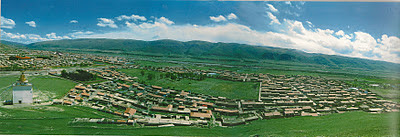By Theurang or Tashi Rabten*
Translated from Tibetan by Bhuchung D. Sonam Our courage is fading amidst stacks of religious texts
Our self-confidence is weakening under foreign occupation
My fellow Tibetans of the same blood and flesh
You are being drowned in tears of sorrow
And being bundle up in pain of agony
Today
Crossing the spine of history I enter into your chest
Staring at you, I write these words I want to convey
At a time when this generation, trapped in the leaves of heavy scripture
Is growing old chanting the six syllable mantra over and over again
When each of our ancient forts and ancestral pillars
Shake from inside amidst the growing whirlwinds
When you think about the lice and nits that suck your blood
Sunbathing on the slopes of Marpori
And this ancient land is turned restless and unlivable
Will this soil become a proud new Tibet or
A place where red hands shamelessly strike at their whim?
My fellow Tibetans, who are drowning in my teardrops,
Today a sharp thread is constricting your blood vessels
A book of crooked words is being thrust into your history
A red hand is digging into your chest
A black tongue is buying up your people
Buying them with sweets lies
Buying them with brute force
At a time
When our land is churned inside out in the name of development
When everything is being ordered from top down
When everything is subsumed in rules and regulations
Isn’t this the time
To exercise your fundamental rights
To assert control over your own life
Your consciousness
Your courage
Your wisdom
Utsangpa, your bones no longer have the smell of
tsampaKhampa, your minds are starved of any new thoughts
Amdowa, you are constantly busy in mutual disputes
Now is the time
To call upon the courage of our conquering ancestors
To raise their warriors’ swords
To invoke their martial spirit
To revisit their tombs and pillars
Now is the time
To rise up from the pool of pain
To raise the Snow Lion flag
Now is the time
For each warrior to stand tall
Like torrents of a waterfall
Like flames of fire
Now is the time for each of us
To do anything anytime anywhere
One year, ten years, one hundred years
After many years
From the Potala Square we hear tunes of Tsangyang Gyatso’s songs
We remember the courage of heroes dead from enemy bullets
We evoke the spirits of our lost mountains, lakes and grasslands
We recall those words written in blood
Again and again from the depth of our souls
Hatred, bitterness, pain, shackles,
From the abyss of flesh and bones
Two heavy words are asking a question
They demand an immediate answer
Like …
The US Declaration of Independence
The
Hind Swaraj of India
The end of apartheid in South Africa
Courage, heroism, slavery, oppression.
Raise the warriors’ swords, my fellow Tibetans
***
* Theurang, author of
Written in Blood and editor of
Shar Dungri or
Eastern Snow Mountain (a magazine banned by China), was sentenced to four years in prison on 2 June 2011 by the Chinese authorities in Ngaba, Amdo, northeastern Tibet.
Notes:
Marpori– literally ‘Red Hill’ on which the Potala Palace was built
Utsangpa– people from Central Tibet
Khampa– people from Kham, Eastern Tibet
Amdowa– people from Amdo, Northeastern Tibet
Tsampa– roasted barley flour, which is Tibet’s staple food
Hind Swaraj– self-rule in India༄༅། །བཙན་པོའི་རལ་གྲི་ཐོགས་དང་བདག་གི་གདོང་དམར་པ།
བཀའ་བསྟན་གྱི་གླེགས་བམ་བར་ན་བཙན་པོའི་སྙིང་སྟོབས་བོར་ཞིང་
གཞན་དབང་གི་ལྕགས་སྒྲོག་བར་ན་ཁེར་ཚུགས་ཀྱི་སྤོབས་པ་ཞ་བའི་
སུས་ཀྱང་མིག་ཟུང་གི་མཆི་མར་བཤམས་པའི
ཀུན་གྱིས་ན་ཟུག་གི་གོང་བུར་བསྒྲིལ་བའི
བདག་གི་ཁ་བ་ཅན ཤ་དར་ཁྲག་དར་གྱི་མི་རྣམས་ཡ
དེ་རིང་ ང་ལོ་རྒྱུས་ཀྱི་སྒལ་ཚིགས་སུ་བུད་དེ་ཁྱེད་ཀྱི་བྲང་ཁོག་སྔོག་གིན་ཡོད
དེ་རིང་ ང་ཁྱེད་ལ་ཅེར་ནས་བླ་སྲོག་གི་སྐད་ཆ་རེ་རེ་ཡེ་གེར་ཕབ་ཀྱིན་ཡོད
གླེགས་བམ་གྱི་ཚི་དྲེག་ཁུར་བའི་མི་རབས་ཤིག
ཡིག་དྲུག་གི་ཟློས་བརྗོད་བར་ན་གོ་མེད་ཚོར་མེད་དུ་རྒས་ལ་ཉེ་བའི་དུས་འདིར
གནའ་བོའི་ཕོ་བྲང་དང་མེས་པོའི་རྡོ་རིང་རེ་རེའང་
ནང་ལོག་ནས་ལྡིང་བའི་རླུང་འཚུབ་ཀྱིས་སྒུལ་གིན་པའི་དུས་འདིར
ཁྱེད་ལ་ཟ་འཁྲིག་སློང་གིན་པའི ཁྱེད་ཀྱི་ཟུངས་ཁྲག་འཇིབས་ཀྱིན་ཤིག་དང་སྲོ་མང་གི་ཚོགས་ཀྱང་
དམར་པོ་རིའི་ཐུ་འོག་ན་ཉི་མར་ལྡེས་འདུག་པར་བསམ་ན
ན་ཆུང་མའི་བྲང་གཞུང་འདྲ་བའི་འདོད་སྲེད་མི་འཇགས་པའི་ཕ་ས་འདི
གཏན་དུ ཐུ་བྷོད་ཅེས་པའི་གསར་བུ་ཞིག་གི་ང་རྒྱལ་གྱི་མགོ་བོ་འཇོག་ས་ཡིན་ནམ
ཡང་ན་ལག་པ་དམར་པོ་ཞིག་གི་ཧམ་སེམས་བསྲིངས་ས་ཡིན།
བདག་གི་མིག་ཆུའི་ཀློང་ན་སྐྱོམས་པའི་ཁ་བ་ཅན་གྱི་མྱི་རྣམས་ཡ
ད་ལྟ རྣོ་ལྕགས་ཀྱི་སྐུད་པ་ཞིག་ཁྱེད་ཀྱི་ཁྲག་རྩའི་སྦུབས་སུ་འཐེན་ཡོད
འཁྱོག་གཟུགས་ཀྱི་ཉིན་ཐོ་ཞིག་ཁྱེད་ཀྱི་ལོ་རྒྱུས་ཁྲོད་དུ་སྤར་ཡོད
ལག་པ་དམར་པོ་ཞིག་གིས་ཁྱེད་ཀྱི་བྲང་ཁོག་ལ་སྙབས་ཀྱིན་འདུག
ཁ་ལྕེ་ནག་པོ་ཞིག་གིས་ཁྱེད་ཀྱི་མི་སེར་ཚོ་བསླུ་བཞིན་འདུག
དབང་ཤེད་ཀྱིས་བསླུ་བཞིན་འདུག
གཡོ་ཟོལ་གྱིས་བསླུ་བཞིན་འདུག
ག་ས་གང་ན་འཛུགས་སྐྲུན་རྫུན་མས་འཚང་ཁ་རྒྱག་གིན་པའི་དུས་འདིར
ཐམས་ཅད་མྱི་ལག་གི་འཆར་གཞིར་གྱུར་ནས་ཡོད་པའི་དུས་འདིར
ཡོད་ཚད་ཁྲིམས་ལུགས་ཀྱིས་བཟོ་བཀོད་གནང་བའི་དུས་འདིར
དུས་འདིར ཁྱེད་ཀྱི་བླ་སྲོག་དང་རྣམ་ཤེས དཔའ་སྟོབས་དང་ཤེས་རབ་ཁོ་ན
ཁྱེད་གཅིག་པུར་དབང་ཆོག་ཆོག་གི་མཐའ་མཇུག་གི་གདམ་ཀ་མ་ཡིན་ནམ
རུས་རྐང་དུ་རྩམ་དྲི་བོར་བའི་དབུས་གཙང་པ་ཚོ
བསམ་བློར་མུ་གེ་ཐེབས་པའི་ཁམས་པ་བ་ཚོ
ཤན་འདན་ནང་འཁྲུག་གི་གཏམ་རྒྱུད་གྱེར་བའི་མདོ་སྨད་པ་རྣམས
ད་ནི རྟུལ་ཕོད་ཀྱི་དཔའ་དང་སྤོབས་པས་རྒྱལ་ཁམས་གནོན་པའི་རང་ཅག་གི་མེས་པོ་ཚོ
མེ་པོ་ཚོའི་རང་གྲིང་དང་དཔའ་སྙིང་ བང་སོ་དང་རྡོ་རིང་
རེ་རེ་བཞིན་དཔའ་སྤོབས་ཀྱིས་ཡར་ལ་བསླངས་རན་རེད
ད་ནི ན་ཟུག་གི་དུད་དུ་འཕག་འཚག་དང་
ཤ་འཁོན་གྱི་ཕྱིར་དུ་དར་ཆ་འཆང་རན་རེད
ད་ནི མི་སྐྱེས་དཔའ་བོའི་ཚོགས་དག་རེ་རེ་བཞིན
རྦབ་ཆུ་ལྟར མེ་འཔུང་ལྟར་འཕྱོ་རན་རེད།
ད་ནི ཅི་ཞིག་ནུས་ན་ཅི་ཡང་བྱེད་རན་ནོ
ལོ་གཅིག ལོ་བཅུ ལོ་བརྒྱ
ལོ་ཟླ་མང་པོ་ཞིག་གི་རྗེས་སུ
པོ་ཏ་ལའི་ཐང་ཆེན་ནས་ཚངས་དབྱངས་རྒྱ་མཚོའི་འགྲུལ་བཞུད་དྲན་གྱིན
ཤོར་ཟིན་པའི་རི་ཆུ་ནགས་གསུམ་གྱི་སྙིང་བཅུད་དྲན་གྱིན
ན་ཟུག་གིས་ཡང་ནས་ཡང་དུ་བཀླགས་མྱོང་བའི
ཁྲག་དམར་གྱིས་དུས་དང་དུས་སུ་བྲིས་མྱོང་བའི་ཡོག་འབྲུ་གཉིས་དྲན་འོང་
ཚེ་སྲོག་གི་གཏིང་མཐའ་ནས་དྲན་འོང
ཞེ་སྡང ཤ་འཁོན ན་ཟུག ལྕགས་སྒྲོག
བདག་གི་ཤ་གསེང་རུས་རྐང་ན
ལྗིད་ཏིག་ཏིག་གི་ཡིག་འབྲུ་གཉིས་ཀྱིས་ཚ་འདྲི་སློང་གིན་འདུག
ཨ་རིའི་རང་བཙན་བསྒྲགས་གཏམ་འདྲ་བའི
ཧིན་རྡིའི་རང་སྲིད་རང་སྐྱོང་ལྟ་བུའི
ད་དུང་ཧྥེ་གླིང་གི་མི་ནག་བཅིངས་གྲོལ་ལྟ་བུའི
ཡིག་འབྲུ་གཉིས་ཀྱིས་ཚ་འདྲི་སློང་གིན་འདུག
རྟུལ་ཕོད དཔའ་མཛངས བྲན་གཡོག གཉའ་གནོན
ཀྱེ་ཀྱེ བཙན་པོའི་རལ་གྲི་ཐོགས་དང་བདག་གི་གདོང་དམར་བ།
































